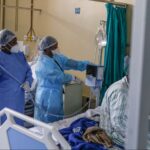A damning report by the Commission for Gender Equality (CGE) has exposed a horrifying reality at several South African universities: sexual harassment is rampant, with students, particularly first-years, being coerced into sexual favours for accommodation and others resorting to sex work to survive.
The findings, which emerged from research conducted at Nelson Mandela University (NMU), North-West University (NWU), and Sol Plaatje University (SPU), paint a grim picture of the vulnerability of students within the higher education system.
This revelation is particularly worrying for Zimbabwean and other foreign parents who send their children to study in South Africa, especially considering the thousands of students, including many prestigious Presidential Scholarship recipients, who pursue their education across the border as they are the most vulnerable ones.
The CGE’s study involved 25 individual interviews with student representative council (SRC) members, staff from transformation and gender-based violence (GBV) offices, and peer educators, along with nine focus group discussions across the three institutions.
The research aimed to understand students’ perspectives on the factors contributing to the persistence of sexual harassment. However, the CGE acknowledged a limitation: the deliberate exclusion of students who had directly experienced sexual harassment to avoid causing further emotional distress.
At NMU, the LGBTQIA+ focus group discussion highlighted disturbing patterns. Participants reported widespread sexual harassment, including “quid pro quo demands, rape, verbal and physical sexual assault, and what the participants referred to as ‘cat talks'”.
A particularly alarming revelation concerned the allocation of student accommodation. “An example was offered of a system where the student leadership [SRC] were given a dozen rooms per residence to administer and allocate themselves. This gave unfettered power to the student leadership, which they abused and engaged in quid pro quo transactions of rooms for sexual favours,” the report stated.
One SRC leader confirmed this abuse of power, stating: “When you get help from a comrade, you must give them something. When they offer and then you say no, and you tell your comrades – they’re like, you’re done!”
This abuse disproportionately affected vulnerable first-year students seeking assistance. Furthermore, the LGBTQIA+ students reported a lack of awareness regarding sexual harassment policies and a reluctance from heterosexual security personnel to take same-sex relationship harassment cases seriously, with one student stating: “They don’t take the lesbian community seriously as they believe we are both girls and why would we fight.”
The report also highlighted the inadequate resources available at NMU to address sexual harassment complaints, noting that “NMU has one case coordinator for all the campuses, and this may pose a capacity challenge that negatively affects efficiency in reporting.”
At NWU, the situation was equally concerning. The study revealed a significant lack of awareness about sexual harassment amongst students, coupled with the influence of power dynamics between students and student leaders. The most common forms of GBV reported included rape, sexual harassment, physical violence, intimate partner violence (IPV), and hate crimes.
A particularly shocking finding was the prevalence of sex work among students as a survival mechanism. “Participants shared that some students engage in sex work to survive,” the report stated.
This was corroborated by women’s focus groups, while men’s groups predominantly reported unwarranted touching and verbal sexual advances. A Student Counselling and Development (SCD) staff member highlighted the concerning trend of “marriage internships,” where students cohabit in relationships resembling adult relationships, often fraught with violence.
The report also noted delays in concluding investigations, with cases sometimes being closed due to perpetrators resigning before charges were filed. The investigative skills of the university’s officers were also questioned, with concerns raised about weak evidence collection and the potential for unfair advantage to the accused.
One participant noted that investigations were sometimes concluded at the start of or during exams, with charges drawn up but not served, seemingly providing protection for the alleged perpetrators.
A GBV investigator at NWU noted that male victims often felt too shy to report. An SCD official added that, “They victimise new and desperate students who may feel disempowered to report the case.”
The situation at SPU was marked by a lack of coordination and reporting of sexual harassment cases. The report highlighted a lack of a clear policy outlining procedures for complainants, contributing to underreporting.
Students cited bullying, accusations of lying, and a lack of trust in the system as reasons for not reporting harassment. An SRC member expressed concern that the university prioritised maintaining a positive image over addressing the issue, stating: “There is this thing that the [university] wants to maintain a perfect image for everybody, whether it is with the public in general or the students. They are aware of the offenders […] majority of the time they tend to sweep it under the carpet.”
The wellness centre manager at SPU noted that “most of the students do not understand gentleness” and that substance abuse was a contributing factor to sexual harassment.
In response to the report’s findings, NMU denied knowledge of rooms being allocated by student leaders and highlighted their efforts in raising awareness about sexual harassment. SPU emphasised its zero-tolerance policy and its various reporting channels, while NWU had not responded at the time of publication.
The findings of this report raise serious concerns about the safety and well-being of students in South African universities and highlight the urgent need for comprehensive and effective measures to address sexual harassment and support survivors.
The implications for international students, particularly those from Zimbabwe, who represent a significant portion of the student population, are particularly concerning.












